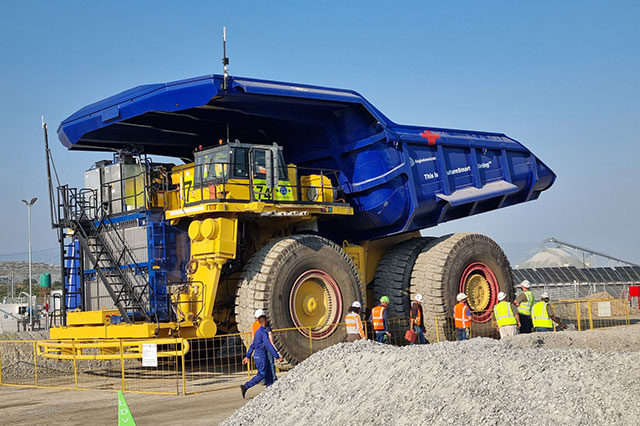Johannesburg – Mining giant Anglo American on Friday unveiled the world’s largest hydrogen-powered truck, a monster weighing in at 220 tonnes, at a platinum mine in northern South Africa.
Billed as the first of a fleet that will replace the firm’s diesel-powered trucks, the vehicle uses two-megawatt hydrogen fuel cells to haul up to 290 tonnes of ore.
“What we are launching is not merely an impressive piece of machinery, it is the genesis of an entire ecosystem powered by hydrogen,” President Cyril Ramaphosa said.
Comparable in size to a small house, the behemoth was shown off at Mogalakwena mine, about 250km (150 miles) from Johannesburg.
“This is a gigantic leap for South Africa’s hydrogen future economy,” Ramaphosa declared.
[PICS]: President @CyrilRamaphosa officiates the launch of AngloAmerican’s historic hydrogen-powered nuGen™️ Zero Emission Haulage Solution – a 510-ton truck – at the Mogalakwena Platinum Mine in Limpopo Province. pic.twitter.com/bzLJPklH6L
— Presidency | South Africa ?? (@PresidencyZA) May 6, 2022
“This has really been a historic moment. It gives us a clear vision of what the future looks like.”
Anglo American said it aims to be carbon neutral by 2040.
It will use solar power to provide the fuel, using the energy to split water into its component atoms of hydrogen and oxygen.
ALSO READ: SA’s platinum and gold mining giant Sibanye-Stillwater eyes Brazil copper, nickel mines
Burning hydrogen releases only water vapour, not heat-trapping carbon dioxide as in the case of fossil fuels.
“Over the next several years, we envisage converting or replacing our current fleet of diesel-powered trucks with this zero-emission haulage system, fuelled with green hydrogen,” chief executive Duncan Wanblad said.
“If this pilot is successful, we could remove up to 80 percent of diesel emissions at our open pit mines by rolling this technology across our global fleet.”
Last November, rich nations including France, Germany, Britain and the United States pledged at least $8.5 billion and technical assistance to help South Africa switch to a low-carbon economy.
Follow African Insider on Facebook, Twitter and Instagram
Source: AFP
Picture: Twitter/ @PimaniBaloyi
For more African news, visit Africaninsider.com


